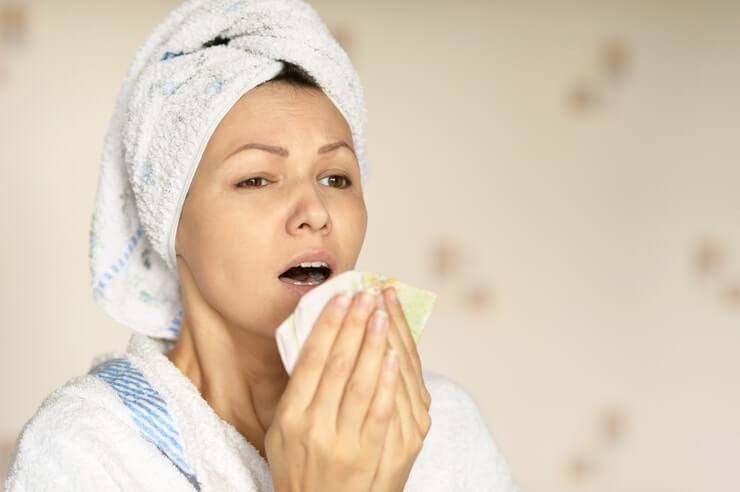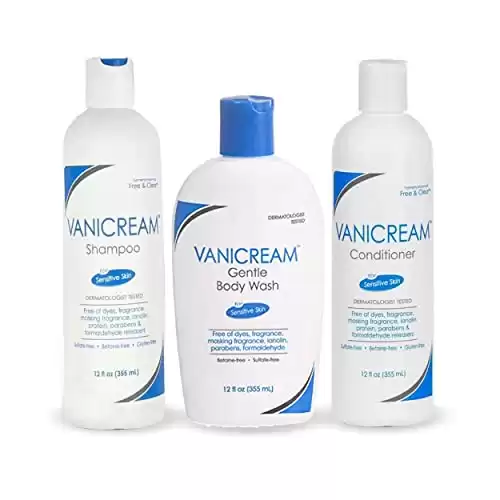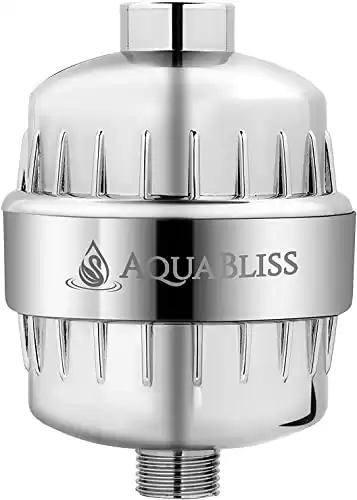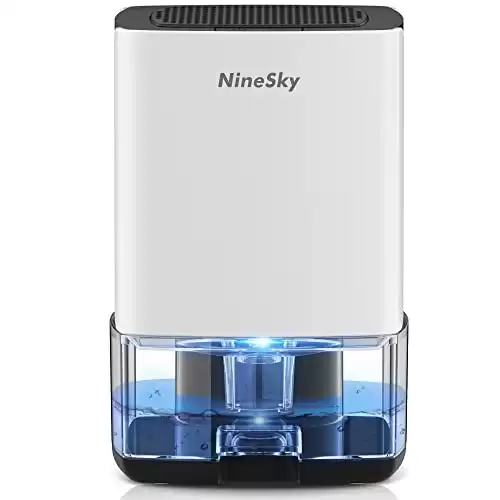There are a lot of things that trigger a person to sneeze, some more bizarre than others. It can happen at the most peculiar of times, too, like during or after a shower. If you often fall into sneezing fits after you take a shower, you’re not alone. Even a seemingly harmless daily routine, like taking a cold or hot shower, can be the reason why you’re sneezing so much.
A sneeze or two shouldn’t be too bothersome. But sneezing fits that leave your whole face red by the time you get out of the shower is another beast. No one wants to come out of a supposedly refreshing shower all snotty and out of breath from sneezing.
It’s time to find out the reason why you’re sneezing after a shower and what to do about it.

Why Do I Sneeze After a Shower?
If you experience recurring or worsening sneezing fits after showering, it might be that parts of your routine and the shower space contain something that is aggravating your allergy symptoms.
Anything can be an allergen: the shower water, ingredients of your shower products, dust and mold in the shower, and many other possible aggravators.
Your body overreacts to these allergens, which is why you are sneezing during or right after showering. But sneezing might not be the only allergy symptom you’re experiencing.
Other Symptoms You Might Experience
Symptoms vary, meaning it can be sneezing alone or sneezing fits plus one or more of these symptoms:
- Coughing
- Stuffy nose
- Runny nose
- Mild headache
- Sore throat
- Red, watery eyes
- Itching
- Hives
Sneezing after a shower can be a one-time or a recurring symptom.
It can also last a few minutes only or become severe sneeze attacks that can last so much longer.
Knowing what causes these sneezing fits will help you stay away from allergens that cause these symptoms.
What’s Causing You to Sneeze After the Shower and What to Do
Like anywhere inside the house, many things in the shower can trigger an allergic reaction such as sneezing.
This reaction is usually harmless but can be incredibly annoying, especially when you can’t control your sneezing.
Continuous sneezing after a shower can be due to the following reasons:
Dust Mites
Dust mites are tiny bugs that can live in mattresses, beddings, upholstery, and carpets. If you have a carpet or a rug right at the shower door, that might be a home for dust mites too.
Fabric shower curtains are also an ideal place for them to live, especially because of the high humidity in the shower.
Dust mites feed on dead skin cells, whether it’s from people or pets, as well as fungi and bacteria, which are plenty available in the bathroom.
Dust mites are one of the common allergens, and if there are enough of them, they can certainly be the reason you’re sneezing after a shower.
What to Do:
Wash curtains and rugs in hot water at least once a week. If you can put them in the dryer, do so at 130-degrees Fahrenheit for at least 15 minutes. Dust mites won’t take too kindly to hot temperatures.
Keeping the shower clean and dust-free and getting rid of any dust-collecting items in the shower or bathroom can also help get rid of them.
You don’t need any special cleaning equipment or solution to get rid of dust mites and stop sneezing after a shower.
Mold Spores
High-humidity and damp areas like the shower is welcome space where mold grows.
A musty and sour odor in the shower is a dead giveaway that there’s mold growth.
You can also identify mold by damp and muddy spots on shower walls and floor corners where it’s damp and dark.
Mold spores range in color from white, green, yellow, and black, and they will feel muddy when touched. That black stuff staining your shower tile grout is most likely mold as well.
Even nontoxic shower mold can cause allergic reactions like excessive sneezing in the shower when inhaled.
What to Do:
You don’t need to get a special cleaning solution to get rid of mold in the shower.
- Combine equal amounts of distilled water and white vinegar in a spray bottle.
- Use it to spritz mold and mildew growing in the shower and let the solution do its work for at least 10 minutes.
- Mold stains should start fading on their own, then rinse with water afterward.
For stubborn mold, spritz the solution on affected areas again and use a brush to scrub the mold away.
Avoid using bleach to get rid of mold in the shower. Although bleach will remove mold at first, it tends to grow back stronger.
Hot Showers
Taking hot showers is super relaxing, whether you do it to start or end the day.
Unfortunately, that supposed spa-like hot shower can cause its own sneezing fit as well.
This is due to the allergic reaction some people experience in response to the sudden rise of their body temperature.
If you are hypersensitive to sudden changes in temperature, taking a hot shower can lead to a sneeze attack afterward.
What to Do:
Tone down the water temperature a bit. Switch your hot shower to a lukewarm one.
But if you badly want to get a hot shower, at least ease your body temperature into it. Don’t get right under the shower.
Cold Showers
Most people won’t dare to take a cold shower until it’s the dog days of the summer and you need to cool off.
But if you decide to take a cold shower, the cold temperature can also cause a sudden change in your body temperature.
Again, if you’re ultra-sensitive to temperature change, taking a cold shower when you’re feeling extra hot may lead to a sneezing fit.
What to Do:
Take a lukewarm shower instead. It can help you avoid sneezing after a shower.
Fragrance in Shower Products
Another thing that can trigger allergic reactions like sneezing after a shower is fragrance, particularly the artificial ones in your shower products.
Any strong smell from your shampoo, conditioner, body wash, or bar of soap can be the reason you’re sneezing after a shower.
If your sneezing after showering becomes frequent, which might often include an itchy or stuffy nose, think about changing your shower products.
What to Do:
Check the ingredients of the shower products you use and keep away from those with fragrances.
Even those with a “natural fragrance” can still trigger your sneezing, so pay attention to what products cause the flare-ups of your reaction.
Avoid those that list “fragrance” as an ingredient to be safe.
Switching to hypoallergenic shower products can be a great help in reducing your sneezing fits after a shower.
Vanicream offers a range of hypoallergenic shampoos, conditioners, and body washes that are designed to be gentle on your skin and senses.
Vanicream shower products have been formulated to avoid common chemical irritants and harsh cleansing agents. They are free of dyes, fragrance, masking fragrance, lanolin, parabens, formaldehyde, and formaldehyde releasers. Tested and recommended by dermatologists.
Chlorine in Shower Water
Even if you’re not allergic to chlorine, you can still be sensitive to it.
If you’re sneezing after a hot shower or when steam is present, chlorine in the shower water can get into your airways and cause an allergic reaction.
Chlorine in shower water doesn’t only make you sneeze. You may also experience difficulty in breathing and burning in the eyes.
Although chlorine and bleach help kill bacteria, viruses, and parasites, too much of it in your shower water has negative side effects.
What to Do:
There’s only a single thing you can do about it – get a filtered shower head, so you can feel safer while showering.
Vitamin C shower filters are especially effective in removing chlorine and chloramine, a combination of ammonia and chlorine, from your shower water.
Each AquaBliss SF100 cartridge is packed full of premium filter media and beneficial Vitamins & Minerals to help reduce harmful chemicals and promote healthy hair, skin & nails. No chemicals are added to mask poor water quality. Fits all shower types.
Using Bleach Products in the Shower
Like chlorine, bleach fumes are another reason why you might be sneezing in the shower.
You might not be using bleach while showering, but your shower cleaner may contain bleach.
That strong chemical odor can last for a couple of days.
So, if you cleaned your shower with a bleach solution yesterday, it might be the cause of your sneezing fit after your shower today.
What to Do:
When using bleach in the shower, always ensure the area is adequately ventilated.
Open the bathroom door, window, and turn the vent fan on.
Rinsing the bleach solution after cleaning will also prevent leftover residue.
High Humidity
The high humidity in the shower can be another reason why you’re sneezing after showering.
Humidity tends to loosen up and even increase the amount of mucus in your nose, causing sneezing, congestion, and a runny nose.
What to Do:
Try lowering the humidity in your shower.
This can be done by simply opening the shower window every time you take a shower, turning on the bathroom fan, or taking shorter, cooler showers instead of hot ones.
You can also consider using a bathroom dehumidifier to maintain a comfortable humidity level.
This compact dehumidifier is perfect for controlling humidity in small spaces like bathrooms. It helps to prevent problems like excess moisture, mold growth, and damp clothes. The auto shut-off and overflow prevention features make it worry-free to use.




